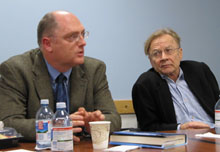
October 21, 2010 — When Eric Pooley started writing The Climate War three years ago, he didn’t think the book was going to be a “whodunit.”
At the time, he recalled, the climate-change debate was shifting from scientific questions to matters of politics and economics — “‘Is this real?’ to ‘What the heck are we going to do about it?'” as Pooley put it during his Speaker Series talk. “I knew it wasn’t a slam dunk, but I had no idea how difficult it was going to be.”
And difficult it was. Pooley’s book turned out to be a dissection of how the effort to enact climate-change legislation failed. “It became a little like Agatha Christie’s Murder on the Orient Express, because there were a lot of people who were in on the murder,” said Pooley, a fall Shorenstein 2008 fellow and now deputy editor of Bloomberg Businessweek. While climate change “deniers” played a central role, another suspect that came up again and again was the White House.
When Rahm Emanuel said early in the new administration that the White House wouldn’t push for a climate bill if the votes weren’t there, it became “a self-fulfilling prophecy,” Pooley said. The Waxman-Markey bill passed the House in June 2009, but didn’t get any farther. Senators John Kerry, Joe Lieberman and Lindsey Graham proposed a compromise bill in 2010, but that effort also faltered. “The fact is, the White House didn’t try to get it passed,” Pooley said. “It really required leadership.” When Obama decided to move health care ahead of climate-change legislation, Pooley said, that was “the death knell.”
Pooley isn’t without hope, however. “Legislative action is off the table, but that doesn’t mean that climate action is off the table.” Because of a 2007 Supreme Court decision, the EPA can regulate heat-trapping gases in automobile emissions, and seems inclined to use that power.
Efforts at the state level can make a considerable difference, Pooley said, pointing to “aggressive” renewable energy standards enacted by many western states, including California, Texas, and Colorado. Corporations are also making great strides, Pooley said. “It’s climate action with training wheels,” Pooley said, “but I’m in favor of training wheels at this point.”
This article was written by Leighton Walter Kille and the photos taken by Janell Sims, both of the Shorenstein Center.

